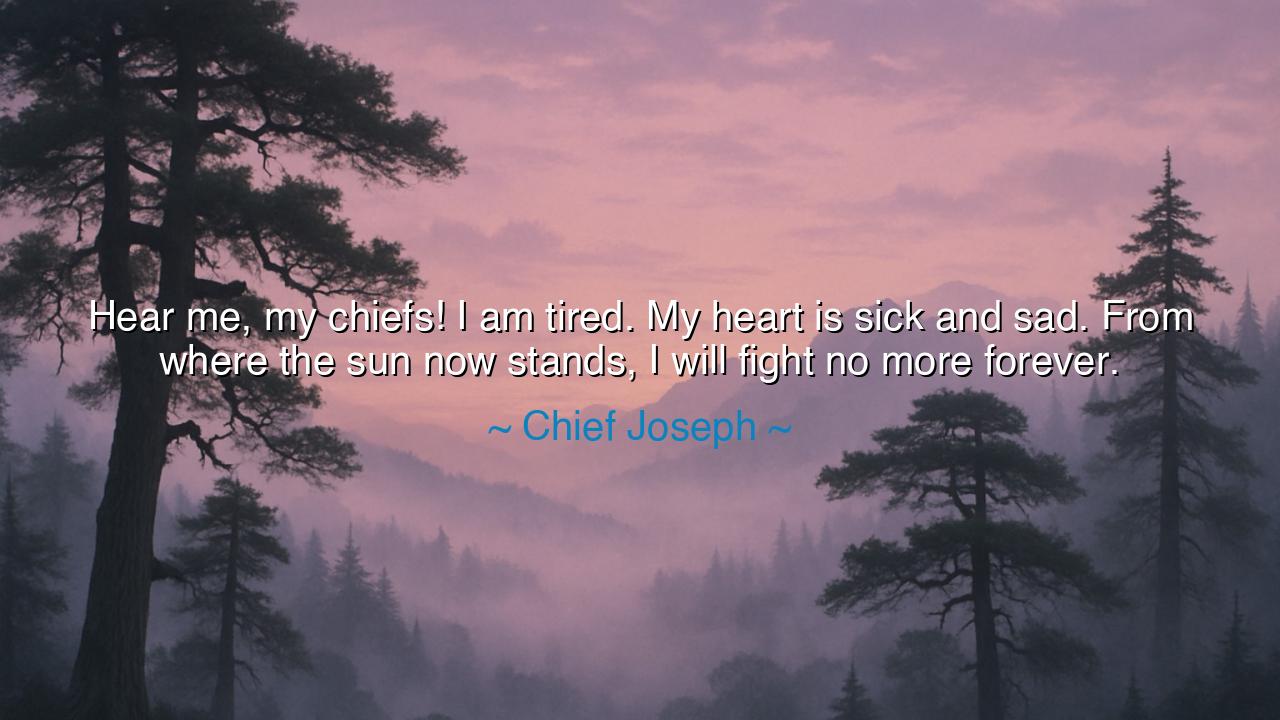
Hear me, my chiefs! I am tired. My heart is sick and sad. From
Hear me, my chiefs! I am tired. My heart is sick and sad. From where the sun now stands, I will fight no more forever.






The words of Chief Joseph, “Hear me, my chiefs! I am tired. My heart is sick and sad. From where the sun now stands, I will fight no more forever,” echo across time like the final breath of a noble spirit bowing before the weight of human sorrow. Spoken in 1877, these words were uttered at the end of the Nez Perce War, when Chief Joseph of the Nez Perce tribe surrendered to the U.S. Army after a long and tragic journey toward freedom. But this was not merely a cry of defeat — it was a testament of dignity, a declaration of peace born not from weakness, but from the exhaustion of compassion. These words belong to the language of eternity, for they speak to every soul that has loved deeply, fought bravely, and at last chosen mercy over vengeance.
To understand the depth of Chief Joseph’s words, one must first understand his path. The Nez Perce people were driven from their ancestral lands in the Wallowa Valley after promises made by the American government were broken. Joseph, who had once believed in peace, was forced to lead his people on a desperate flight toward Canada — a journey of more than a thousand miles, pursued by soldiers, enduring hunger, cold, and loss. His people fought bravely, defeating armies far greater in number, but they were hunted without rest. When finally surrounded and broken, Chief Joseph looked upon the suffering of his women and children — freezing, starving, dying — and chose to surrender, not because he was conquered, but because he would not allow his people to perish. It was then that he said, “I am tired. My heart is sick and sad. From where the sun now stands, I will fight no more forever.”
In those words, we hear not the voice of defeat, but of wisdom. The ancients would have called it the wisdom of the weary, the moment when the warrior sees beyond battle and understands the greater truth — that peace, though costly, is holier than endless conflict. Chief Joseph’s surrender was not a loss of courage but a victory of conscience. Like King Ashoka of India, who turned from conquest to compassion after witnessing the suffering of war, Joseph too chose to lay down the sword to preserve the spirit of his people. He understood that victory bought with blood can never heal the heart.
There is a deep and haunting nobility in saying, “I will fight no more forever.” For it does not mean the end of struggle; it means the end of violence as a means of redemption. It means to rise above the primal urge to destroy and to instead embrace the ancient law of life — that peace must be chosen, even when war is easier. Chief Joseph’s heart was “sick and sad” because he saw what all great leaders eventually see: that war consumes the innocent and righteous alike. His fatigue was not physical alone, but spiritual — the exhaustion of a soul that has seen too much death, too much broken promise, too much suffering inflicted by human pride.
There is a quiet heroism in his surrender that the world too often misunderstands. In every age, there are those who continue to fight when wisdom calls for rest. They mistake fury for strength and vengeance for justice. But Joseph’s legacy teaches us that true strength is restraint, and that sometimes the bravest act a person can make is to say, “Enough.” His choice preserved not his land, but his people’s spirit — their story, their language, their memory. Even in defeat, he remained unconquered, for he refused to let hatred own his heart.
In the modern world, Chief Joseph’s words still carry sacred relevance. We, too, fight endless battles — within ourselves, with one another, with the world around us. We fight to prove our worth, to defend our egos, to avenge our hurts. But the time comes for every soul when the heart grows “tired and sad,” and wisdom whispers: “You do not need to fight anymore.” To stop fighting does not mean to stop caring — it means to stop destroying yourself in the name of winning. It means to choose healing over harm, peace over pride, rest over rage.
The lesson, then, is both ancient and eternal: know when to lay down your weapons. Whether those weapons are anger, fear, or stubborn pride, there comes a day when continuing to fight only deepens the wound. Like Chief Joseph, we must learn to see beyond the battlefield, to listen to the heart when it says, “Enough.” Seek peace not as surrender, but as transcendence. For from where the sun now stands — in your own life, in your own struggles — there is wisdom in rest, dignity in forgiveness, and power in letting go.
And so, let his words live on not as a lament, but as a guide for generations: when the heart grows weary, when the soul feels torn between resistance and mercy, remember the courage of Chief Joseph — the leader who, when faced with despair, chose peace, and in doing so, became eternal.






AAdministratorAdministrator
Welcome, honored guests. Please leave a comment, we will respond soon